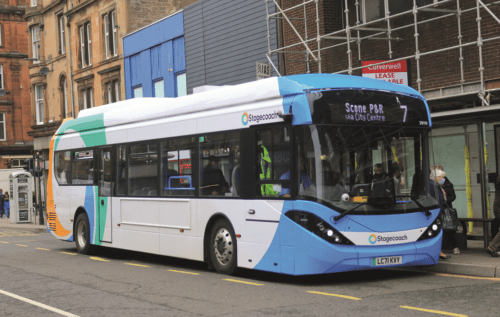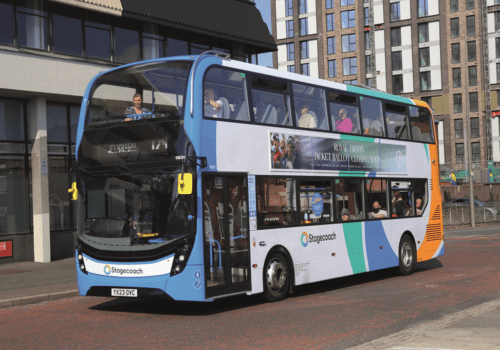
Stagecoach Group has published its interim results for the half-year to 28 October 2023. On a total revenue of £773.2m, up from £669.6m in the previous comparable period, the group recorded a total operating profit of £51.1m, up from £33.1m, and a profit before taxation of £47.6m. In the period, during which Claire Miles was appointed as Chief Executive, the Group says it has completed the implementation of a simpler, leaner organisational structure.
The Group reports growth in regional passenger demand with a 5.3% increase in regional bus passenger journeys in the half-year to 28 October 2023 compared to the equivalent prior year period, helped by a supportive government policy which continued with the £2 bus fare cap in England underpinning the increase in regional passenger demand. The company reports that in Scotland, the under-22 concessionary scheme continues to support increased patronage, offsetting suppressed demand within the old age and disabled concessionary scheme, whilst in Wales emergency Covid-19 support transitionary funding has been confirmed until March. It also recruited and trained more than 2,300 new bus drivers during the half-year.
Good financial results, which it says reflect business initiatives and continued strength of regional bus operations, saw revenue from regional bus operations grow by 15.1% to £584.7m in the half-year ended 28 October 2023 compared to the comparative prior year period, whilst net debt increased by £60.4m from £241.1m at 29 April 2023 to £301.5m as at 28 October 2023, reflecting net capital expenditure of £62.3m, supporting the transition of its bus fleet to zero-emission vehicles.
The Group expressed disappointment that bids to the second phase of the Scottish Zero Emission Bus Challenge Fund were unsuccessful, but said it is pleased with the professional and constructive manner in which it managed the demobilisation of its Wigan depot prior to the commencement of Transport for Greater Manchester’s new Bee Network franchising system, and that its plans are well advanced for the mobilisation of the services it will operate on behalf of Transport for Greater Manchester from the Middleton, Oldham and Queens Road depots from March 2024.
London
In London, its operations are said to have been challenging with the losses incurred in the period reflecting the impact of upward wage pressure and elevated levels of staff turnover and staff shortages. Lost mileage has also had an impact, the Group said, and has resulted in significant contractual penalties and lost quality incentive income, whilst road works and traffic congestion remain a continuing challenge for all London operators.

However, the Group says it expects profitability to improve as it addresses labour market challenges and seeks to re-price contracts as they are tendered.
Nationwide, the Group recruited and trained more than 2,300 new bus drivers during the period, making a net increase of more than 500 drivers compared to the start of the year.
“We remain grateful for the huge commitment and professionalism of our people who are delivering services safely in our communities day in, day out,” say the directors in their report. “Following the acquisition of the Group in May 2022, a detailed review of the Group’s structure and operations was undertaken. We have simplified our leadership organisational structure, providing greater clarity on decision-making and more focused support to enhance lines of communication and collaboration.”
The Group acknowledges the continuation of recovering passenger demand across its regional bus and tram services, impact of favourable pricing and the effect of the new London businesses acquired in the prior year on its increased profitability in the period.
The directors concluded that: “We remain positive on the long-term outlook for the Group. As we transition towards a post-pandemic world, we are focused on further rebuilding profitability and adapting our services to meet new and emerging travel patterns. Whilst the next General Election may lead to some change in the detail of transport policy, there is broad cross-party support for the role that buses play in delivering government objectives on social equity and inclusion, economic development and levelling-up, and in transport decarbonisation.
“We have worked closely with local and national government in maintaining bus services through the pandemic and into recovery. We anticipate that this close partnership will be a continuing feature of transport policy, including through an expansion of bus service franchising, and we are engaging closely with national and local policy-makers to maximise the opportunities that this will offer.”

